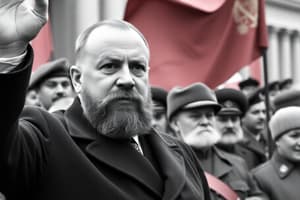Podcast
Questions and Answers
Who led the Bolsheviks in overthrowing the liberal government in Russia?
Who led the Bolsheviks in overthrowing the liberal government in Russia?
- Trotsky
- Joseph Stalin
- Vladimir Lenin (correct)
- Leon Trotsky
What was the primary effect of the Russian Revolution of 1917?
What was the primary effect of the Russian Revolution of 1917?
Removal of Czar Nicholas from power
What was the main concern of the Allies regarding communism?
What was the main concern of the Allies regarding communism?
- It encouraged immigration.
- It promoted capitalism.
- It was seen as a threat to democracy. (correct)
- It had no impact on the Allies.
The violence and unrest in 1919 included _____ and urban riots.
The violence and unrest in 1919 included _____ and urban riots.
Who was A. Mitchell Palmer?
Who was A. Mitchell Palmer?
The National Origins Act reduced the quota of immigrants allowed in the U.S. to 150,000.
The National Origins Act reduced the quota of immigrants allowed in the U.S. to 150,000.
What did the 18th Amendment do?
What did the 18th Amendment do?
Prohibition was successfully enforced after the 18th Amendment.
Prohibition was successfully enforced after the 18th Amendment.
What was a major consequence of the automobile production boom in the 1920s?
What was a major consequence of the automobile production boom in the 1920s?
Which two writers criticized the U.S. government during the 1920s?
Which two writers criticized the U.S. government during the 1920s?
The practice of buying goods and paying for them over time is known as _____.
The practice of buying goods and paying for them over time is known as _____.
What was the role of the Budget and Accounting Act?
What was the role of the Budget and Accounting Act?
The Teapot Dome scandal involved the leasing of naval oil reserves.
The Teapot Dome scandal involved the leasing of naval oil reserves.
During the 1920s, the KKK targeted _____, Jews, Catholics, and reformers.
During the 1920s, the KKK targeted _____, Jews, Catholics, and reformers.
What did the Five Power Treaty aim to limit?
What did the Five Power Treaty aim to limit?
What was one major effect of the Washington Conference?
What was one major effect of the Washington Conference?
Flashcards are hidden until you start studying
Study Notes
Bolsheviks and the Russian Revolution
- Bolsheviks, led by Vladimir Lenin, overthrew the liberal government in Russia and established a communist regime.
- Lenin became the dictator after the Bolshevik takeover, promoting the spread of communism globally.
Impact on Allies and Russian Revolution
- The Russian Revolution resulted in the removal of Czar Nicholas II and the overthrow of Alexander Kerensky's government.
- The US and Allied forces sent troops to fight communists in Russia, which prolonged the civil war and fostered suspicion between the Soviet Union and the West.
Labor Strikes and Unions
- In 1919, 4 million workers went on strike as they sought to retain wartime benefits amidst decreased labor demand.
- Union membership declined during the 1920s due to opposition from businesses, government, and public perception associating unions with greed and communism.
Racial Violence and Social Unrest in 1919
- A surge of violence occurred in 1919 with 70 lynchings and 25 race riots, most notably in Chicago.
- The competition for jobs and housing after the war led to racial tensions, exacerbated by fears of communism.
A. Mitchell Palmer and the Red Scare
- As Attorney General, Palmer attributed social unrest to communist agitators and heightened public fear through bomb threats, including the Wall Street bombing.
- Palmer initiated raids against suspected radicals, leading to the arrest and deportation of thousands, fostering paranoia within American society.
Immigration Legislation and Restrictions
- The Immigration Restriction League emerged, favoring immigrants from Northwestern Europe over those from Southeastern Europe; influenced immigration laws.
- The National Origins Act limited immigration to 150,000 annually, exempting Canadians and Latin Americans while excluding all Asian immigrants.
The Ku Klux Klan
- The KKK was revitalized, promoting white supremacy and targeting minorities such as African Americans, Jews, and Catholics.
- The Klan exploited societal fears, growing to a membership of 4.5 million at its peak.
The Sacco and Vanzetti Case
- Nicola Sacco and Bartolomeo Vanzetti, Italian anarchists, were convicted of robbery and murder despite insufficient evidence, causing public outcry.
- Their case highlighted prejudices and the judicial system's failings, drawing criticism from prominent literary figures.
Women’s Suffrage
- The 19th Amendment granted women the right to vote, representing a significant social change in American politics.
Warren G. Harding's Presidency
- Harding, lacking strong qualifications, won the 1920 election and appointed skilled cabinet members such as Charles Evans Hughes and Herbert Hoover.
- The Ohio Gang, Harding's friends, represented corruption by exploiting government positions for personal gain.
Economic Policies and Tariffs
- Harding's administration supported high tariffs to protect US farmers, negatively impacting foreign trade as nations retaliated with their tariffs.
- He repealed excess profit taxes, reducing overall taxes for the wealthy.
The Teapot Dome Scandal
- The scandal involved Secretary of the Interior Albert Fall leasing US naval reserves for private gain, leading to criminal charges against him.
Innovation and Entertainment in the 1920s
- The automobile industry flourished, with production skyrocketing during the 1920s, leading to suburban expansion.
- Mass media also surged, with the proliferation of radios, movies, and records revolutionizing entertainment and culture.
The Roaring Twenties
- Characterized by cultural shifts such as the rise of flappers, jazz music, and prohibition, reflecting societal changes post-WWI.
- Charles Lindbergh's flight symbolized technological advancements and heroism.
Economic Growth and Credit Systems
- The rise in production and wages did not match up, leading to surplus goods.
- Credit systems allowed consumers to buy goods on installment plans, contributing to economic growth but also increasing personal debt.
Studying That Suits You
Use AI to generate personalized quizzes and flashcards to suit your learning preferences.




